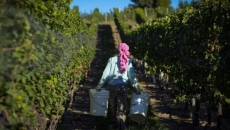The number of complaints from Canadians who say their language rights weren't respected dropped by more than half last year, but the official languages commissioner says it's too early to say there is a downward trend.
In his annual report released Tuesday, Raymond Théberge says his office received 847 admissible complaints between April 1, 2023, and March 31, 2024, down from 1,788 in the previous fiscal year. The last time his office received fewer than 1,000 complaints in a year was in 2017-18, when there were 894.
But he cautioned against drawing conclusions that violations of the Official Languages Act will continue to decline.
The 847 complaints, he told a news conference, "are a bit of a contrast to the very high volume we've become accustomed to in recent years. Is this decrease a sign that federal institutions are complying more fully with their language obligations? .... Only time will tell."
Théberge said some years elicit more complaints than others, such as in 2021, when Air Canada CEO Michael Rousseau caused an uproar when he delivered a speech in Montreal almost entirely in English, and when the prime minister appointed Mary Simon, who wasn't fluent in French, as Governor General.
The commissioner said Air Canada remains the institution most frequently targeted by complaints, but last year the number dropped to 130 from 276 a year earlier. "I think that still indicates that there are challenges with respect to Air Canada to meet their language obligations," Théberge said.
The commissioner's report criticizes "unco-operative institutions" that he says don't accept that they have to be able to serve Canadians in both English and French. At the news conference, Théberge refused to identify which companies, government departments or agencies he was referring to, only saying that the senior management of institutions must set an example and be aware of their obligations regarding the country's two official languages.
The two biggest categories of complaints in Tuesday's report involved communications with the public, with 533, and the language spoken at work, with 227.
"This year, we've had a higher number of complaints regarding the language of work," he said. "So, it's not only the travelling public, but also institutions within the federal government that face challenges in accommodating employees to use both official languages."
Federal institutions subject to the Official Languages Act include Air Canada, Via Rail, Canada Post, the Royal Canadian Mounted Police, and the CBC, as well as all government departments.






